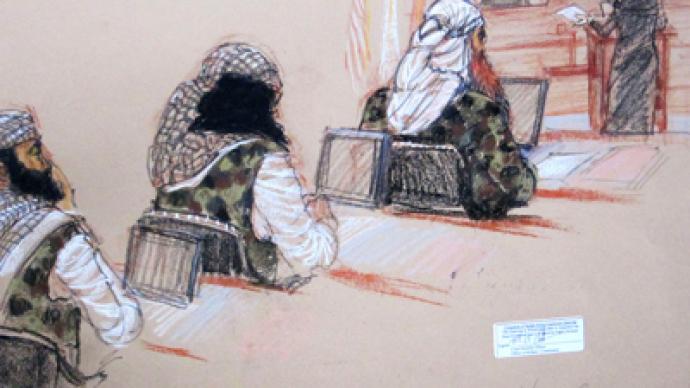9/11 trial censorship? Gitmo court feed cut

The first day of a pretrial hearing for five men accused of plotting the September 11 attacks was swirling with intrigue on Monday after the audio feed at a Guantanamo war crimes court was abruptly cut off.
The incident prompted the military judge to ask whether someone outside the courtroom was censoring the hearing.
Observers were listening to the trial behind a glass window when the feed was suddenly cut. The audio went silent when David Nevin, a lawyer for Khalid Sheik Mohammed – the alleged mastermind of the 9/11 attacks – asked if the lawyers and judges needed to meet in closed session before considering a request by the defense.
In previous hearings for alleged Al-Qaeda operatives sentenced to CIA prisons, a court security officer controlled a button which muffled audio to spectators when secret information was disclosed. During the censoring process, a red light flashes and observers hear nothing but static.
But that wasn’t the case this time around, as the judge’s reaction made clear once the sound was restored moments later.
"If some external body is turning things off, if someone is turning the commissions off under their own views of what things ought to be, with no reason or explanation, then we are going to have a little meeting about who turns that light on or off," Army Colonel James Pohl told the courtroom.
Pohl seemed to be addressing the prosecution team, saying that Nevin had only referred to the caption of an unclassified document asking the judge to preserve as evidence the secret CIA prisons where the defendants say they were tortured, Reuters reported.
Nevin and the other defense attorneys said they wanted to know whether there was a third party monitoring the proceedings, and whether that entity could be listening to private communications between the lawyers and their clients, the Washington Post reported.
Justice Department lawyer Joanna Baltes said she could explain the reason behind the audio cut – but not in public. Pohl said he would meet in closed session with the lawyers and reopen the public part of the hearing on Tuesday. If the reason behind the cut could be explained to the public, he would do so then.
Mohammed and his four co-defendants are accused of training and aiding the hijackers who flew commercial airliners into the World Trade Center in New York, the Pentagon and a Pennsylvania field on September 11, 2001.
They could be sentenced to death if convicted on charges including terrorism, attacking civilians and murdering 2,976 people.
The men were among the suspected Al-Qaeda captives who were moved across borders without judicial review, and held and interrogated in secret CIA prisons overseas during the presidency of George W. Bush.
The CIA has acknowledged that Mohammed was subjected to the controversial interrogation practice known as waterboarding. The defendants also claimed they were subjected to threats, sleep deprivation and being chained in painful positions.
The defense lawyers have argued that the CIA’s treatment of the defendants constituted illegal pretrial punishment, and “outrageous government misconduct” that could justify dismissal of the charges, or at the very least spare the defendants from execution if convicted.
There are currently 166 detainees at Guantanamo Bay detention camp, including Mohammed. In 2009, US President Barack Obama ordered the prison to be shut within a year. However, it is still open and operational.
Guantanamo remaining open is yet another example of Congress overpowering the president – the prison was bundled together with the National Defense Authorization Act, which serves as the overall US defense budget. Obama has the power to veto the entire act, but not to individually challenge the administration of Guantanamo Bay.
Obama has threatened such a veto several times, but backed down on every occasion.














